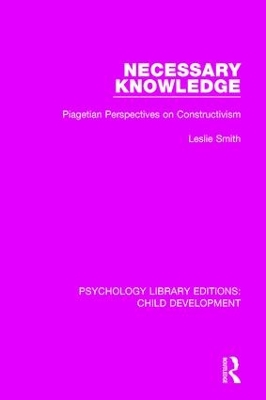Originally published in 1993, this monograph addresses a central problem in Piaget’s work, which is the temporal construction of necessary knowledge. The main argument is that both normative and empirical issues are relevant to a minimally adequate account of the development of modal understanding. This central argument embodies three main claims. One claim is philosophical. Although the concepts of knowledge and necessity are problematic, there is sufficient agreement about their core elements due to the fundamental difference between truth-value and modality. Any account of human rationality has to respect this distinction. The second claim is that this normative distinction is not always respected in psychological research on the origins of knowledge where emphasis is placed on the procedures and methods used to gain good empirical evidence. An account of the initial acquisition of knowledge is not thereby an account of its legitimation in the human mind. The third claim relates to epistemology. Intellectual development is a process in which available knowledge is used in the construction of better knowledge. The monograph identifies features of a modal model of intellectual construction, whereby some form of necessary knowledge is always used. Intellectual development occurs as the reduction of modal errors through the differentiation and coordination of available forms of modal understanding. Piaget’s work continues to provide distinctive and intelligible answers to a substantive and outstanding problem.
- ISBN10 1138037869
- ISBN13 9781138037861
- Publish Date 7 December 2017 (first published 30 June 1993)
- Publish Status Active
- Publish Country GB
- Publisher Taylor & Francis Ltd
- Imprint Routledge
- Format Hardcover
- Pages 250
- Language English
